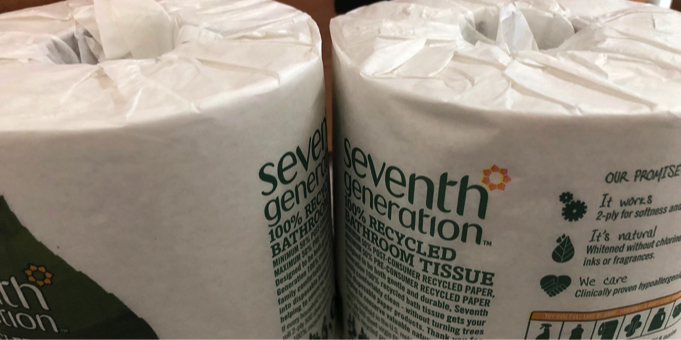Choosing to value convenience over the environment is unsustainable. Since the 1950s, single-use disposable items have become increasingly popular. The result is a throw-away society in which 30% of our waste stream consists of packaging materials – primarily plastics. Disposable … Read More
Category Archives: Tip of the Week
In the single stream recycling process, plastic items are sorted using optical scanners, which use the reflection of light to identify the types of plastic. Black doesn’t reflect light, so it cannot be seen and sorted properly by the scanners. … Read More
CFLs and the other light bulbs contain a small amount of mercury sealed within the glass tubing. When a bulb breaks in your home, some of this mercury may be released as mercury vapor. To minimize exposure to mercury vapor, … Read More
Tips from Sierra Club for buying more sustainable toilet tissue. The average American flushes away 384 trees’ worth of toilet paper in a lifetime, and though we account for just over 4 percent of the global population, we consume 20 … Read More
Food waste is 30-40% of the waste stream. In 2013, 37 million tons of food was discarded by Americans. Roughly 95% of this wasted food was sent to landfills or incinerators. Decomposing food waste in landfills is a significant source … Read More
Here’s information for you to consider from the national magazine of the Sierra Club: As fish stocks continue to shift and decline in response to warming ocean waters, what types of seafood can one responsibly put on the table? To … Read More
Electric clothes dryers have been common for many years, so electrification of clothes drying is not exactly a new frontier. The real push in efficiency for the past decade or so has been with clothes washers—using less (hot) water and … Read More
Bisphenol A, or BPA, is a synthetic estrogen that can disrupt the endocrine system, even in small amounts. It has been linked to a wide variety of ills, including infertility, breast and reproductive system cancer, obesity, diabetes, early puberty, behavioral changes in children … Read More
According to a recent poll by the National Coffee Association, one in five adults get their daily dose of caffeine from one-use coffee pods. That does not bode well for the environment. In 2014, enough pods were purchased to circle the earth … Read More
There are two ways you can make your water heater more efficient. One, wrap it in an insulating blanket. It costs only about $25 at your local home center, and it will cut your carbon emissions by up to 1,000 … Read More





Recently on Twitter